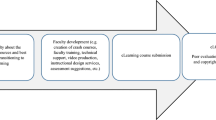Abstract
The Generalization of Information and Communication Technologies in Education program (GENIE) has made way for computers, video projectors, interactive whiteboards and multimedia rooms into many public schools in Morocco, and has worked to add the communicative dimension to the process of technology-assisted teaching. The program also worked on qualifying human resources to be more responsive within the new Information and Communication Technology (ICT) enriched environment by means of occasional workshops and Massive Open Online Courses (MOOCS). Still, in the absence of return on investment (ROI) studies or impact evaluations, the program stirred long controversy over its merits. This paper aims to study the impact of GENIE on teachers and students in middle and high school using an evaluation model conceived by Daniel Kirkpatrick and Thomas Guskey. The process of data mining and analysis took advantage of both quantitative and qualitative approaches, with more emphasis on the second. The study concludes that the flagship ICT integration program in the country is a promising one; however, it falls short of delivering its promise of engaging the Moroccan school into the information society. The program’s 4 axes of operation (infrastructure, training, digital resources and development of use) endure serious impediments that disturb the attainment of the program’s objectives throughout all GENIE’s three phases of execution and will certainly hinder the realization of the ministry’s 2030 vision.








Similar content being viewed by others
Explore related subjects
Discover the latest articles, news and stories from top researchers in related subjects.Notes
Almost 79% of students possess a smartphone
References
Alj, O., & Benjelloun, N. (2013). Intégration des TIC dans l’enseignement des sciences physiques au Maroc dans le cadre du programme GENIE: difficultés et obstacles. Revue internationale des technologies en pédagogie universitaire. International Journal of Technologies in Higher Education, 10(2), 49–65.
Bouziane, A. (2019). ELT issues in Morocco: A research-based perspective (pp. 137-149). MATE ELT series: Book 4. Moroccan Association of Teachers of English (MATE).
Brown, A., & Green, T. (2009). Issues and trends in instructional technology: Web 2.0, second life, and STEM share the spotlight, In educational media and technology yearbook (pp. 7–23). Boston, MA: Springer.
Davies, R. S. (2011). Understanding technology literacy: A framework for evaluating educational technology integration. TechTrends, 55(5), 45.
GENIE Directorate. (2012). Programme GENIE: Guide de Formateur. Module PDPTICE 2012. MEN.
GENIE Directorate. (2016). Programme GENIE Promotion de l’usage des Logiciels & Ressources Educatives Libres (Rep.). From open education day Morocco OER strategy forum, open education day. Marrakesh: Cadi Ayyad University.
Guskey, T. R. (2000). Evaluating professional development. Corwin Press.
Guskey, T. R. (2002). Does it make a difference? Evaluating professional development. Educational Leadership, 59(6), 45.
Guskey, T. R. (2013). 1 Defining Student Achievement. In International guide to student achievement (pp. 21–24). Routledge.
Hamse, M. (2015). D’une capitalisation de l’expérience du programme génie vers une stratégie efficace en e-Learning visant la formation continue des professeurs (Rep.). Colloque international " E-learning , un challenge et une opportunité pour les CRMEF".
Haydn, T. (2014). How do you get pre-service teachers to become ‘good at ICT’ in their subject teaching? The views of expert practitioners. Technology, Pedagogy and Education, 23(4), 455–469.
Hurley, C., Van Eyk, H., & Baum, F. (2002). Insider knowledge and outsider objectivity–the benefits and risks of combined evaluator roles in a study of health care reform. Evaluation Journal of Australasia, 2(2), 60–68.
Jerrad, E. (2015, May 26). GENIE evaluation [personal interview].
Kabbaj, M., Talbi, M., My, M. D., & Abouhanifa, S. (2009). Programme GENIE au Maroc: TICE et développement professionnel. MathémaTICE journal, 16.
Kirkpatrick, D. (1996). Great ideas revisited. Training & Development, 50(1), 54–60.
Kirkpatrick, D. L. (2009). Implementing the four levels: A practical guide for effective evaluation of training programs: Easyread super large 24pt edition. ReadHowYouWant. com.
Kirkpatrick, D. L., & Kirkpatrick, J. (2006). Evaluating training programs: The four levels. Williston: Berrett-Koehler.
KPMG Consulting LP. (2000). Evaluation of the SchoolNet1 Initiative. Final Report (Rep.). Industry Canada.
Messaoudi, F. (2012). Évaluer la stratégie nationale d’intégration des TICE au Maroc : proposition d’une approche à base d’indicateurs. Presentation, INRE, Revue N°3, Alger.
Ministry of Education. (2015). A clarification letter to the director of PJD website. Rabat.
Moldovan, L. (2016). Training outcome evaluation model. Procedia Technology, Elsevier, 22, 1184–1190.
Nachit, B., Tamani, S., Radid, M., Namir, A., & Talbi, M. (2013). Mathematics teachers’ participation in Innovative teacher’s contest in Morocco. International Journal of Research In Education Methodology, 4(1), 372–381.
Tamkin, P., Yarnall, J., & Kerrin, M. (2002). Kirkpatrick and beyond: A review of models of training evaluation. Brighton, England: Institute for Employment Studies.
UNESCO Institute for Statistics (2009). Guide to Measuring Information and Communication Technologies (ICT) in Education. Montreal: UNESCO Institute for Statistics. Retrieved March 14, 2014 from https://unesdoc.unesco.org/images/0018/001865/186547e.pdf
Funding
This study was not funded in any shape or form by any party.
Author information
Authors and Affiliations
Corresponding author
Ethics declarations
Conflict of interest
The author declares that he has no conflict of interest.
Additional information
Publisher’s note
Springer Nature remains neutral with regard to jurisdictional claims in published maps and institutional affiliations.
Rights and permissions
About this article
Cite this article
Ismaili, J. Evaluation of information and communication technology in education programs for middle and high schools: GENIE program as a case study. Educ Inf Technol 25, 5067–5086 (2020). https://doi.org/10.1007/s10639-020-10224-1
Received:
Accepted:
Published:
Issue Date:
DOI: https://doi.org/10.1007/s10639-020-10224-1




